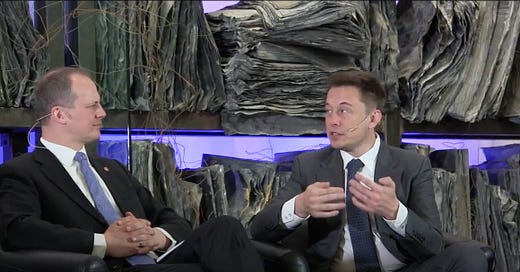EV Pioneer Elon Musk on the Enduring Need for Oil
From my pre-Substack archives - remembering a valuable reality check made by Musk in the country buying the most Teslas but also exporting lots of oil.
When Elon Musk speaks about anything (except Twitter and space), his vision of an electrified planet with clean energy generation is always in the foreground.
Here, he casts progress in the broader context of the enduring need for oil (and natural gas). I’m reposting this snippet of video because I’m thinking a lot these days about one of the “unusual suspects” in humanity’s intertwined climate and energy challenges — inertia.
The moment came when he spoke at a conference on the Future of Transportation in Oslo, Norway, on April 21, 2016. I popped over while participating in our simultaneous meeting of the Anthropocene Working Group, which, with some irony, took place a few hundred yards from the headquarters of what was then StatOil (now Equinor, with no mention of that petroleum product).
At the transportation event, member of the audience asked Musk a tough question and he gave a reality-based answer.
Audience member:
In Norway, our income is based on oil and gas. Now we’ll be drilling for more oil and gas in the Bering Sea to preserve the welfare state. I would like to hear your point of view on this.
Musk:
There is actually a necessary short- to medium-term role for oil and gas because sustainable power generation and electric vehicles are still at the early stage. It takes time to scale up and get to high volumes. The real thing that’s important for hydrocarbons is to correctly price the un-priced externality of the impact on the environment. Market mechanisms work very well when the pricing is correct. If the pricing of oil and gas does not include the environmental impact that is a de facto subsidy.
I’m disinclined to vilify the oil and gas industry because if we didn’t have them there would be economic collapse and people would be starving to death. It is very necessary in the short term. It’s just that we need to be taking the steps to accelerate the transition to a sustainable energy economy in Norway and throughout the world as quickly as possible. The faster we do that, the better off the world will be and the lower will be the long-term environmental impact.
Video of the full talk is here.
More on the transportation meeting is here: Tesla founder thanks Norway.
Finally, here’s an oil-related excerpt from my long essay on the Anthropocene, describing the odd feeling I had in Oslo that April, walking each morning to the Anthropocene Working Group meeting:
~~
There was some irony in the stroll each day between our hotel and the Nansen Institute. It took us along the shore in front of a giant Jenga-block scramble of horizontal white towers that belong to Statoil. Norway’s mostly state-owned oil company has contributed substantially not only to Norway’s economy but also to global climate change. Even as Norway was adding incentives for drivers to buy electric vehicles to take advantage of ample domestic hydro-electric power, the company announced plans to expand drilling in the Barents Sea to boost fossil-fuel exports. One got the impression that decisions made in that building would have a bigger impact on world affairs than any conclusions we produced.
But there was a second layer of irony there on the windswept shores of the fjord. The grassy stretch along the sinuous path was also a sculpture park. A vertical slab rose from the grass directly in front of the Statoil building, imprinted with an image of one of Easter Island’s moai — the haunting stone figures carved at the potent pinnacle of the great, but vanished, Rapa Nui civilization.







Just upgraded to Paid. Andy, will we see you at SEJ? Comment: this Reality Check will be raising it's tousled, greedy, often quite correct head soon. We need some real figures for a rational transition. Of course, when has Our Species ever made a rational transition?
I did not take you for a Musk Bro!
The same old bridge fuel line. Of course, if we transition too fast it becomes more expensive to get into space. Musk is making sausage these days.
On another note. Have you ever interviewed Mark Jacobsen on WWS? Or on the false solutions of hydrogen, CCUS, or the problems of LNG?